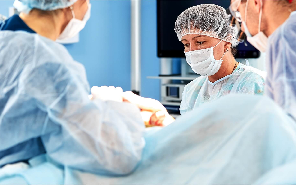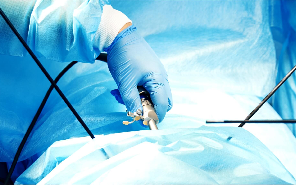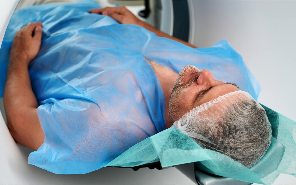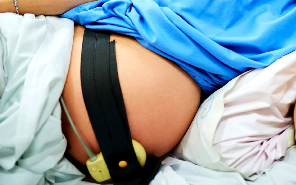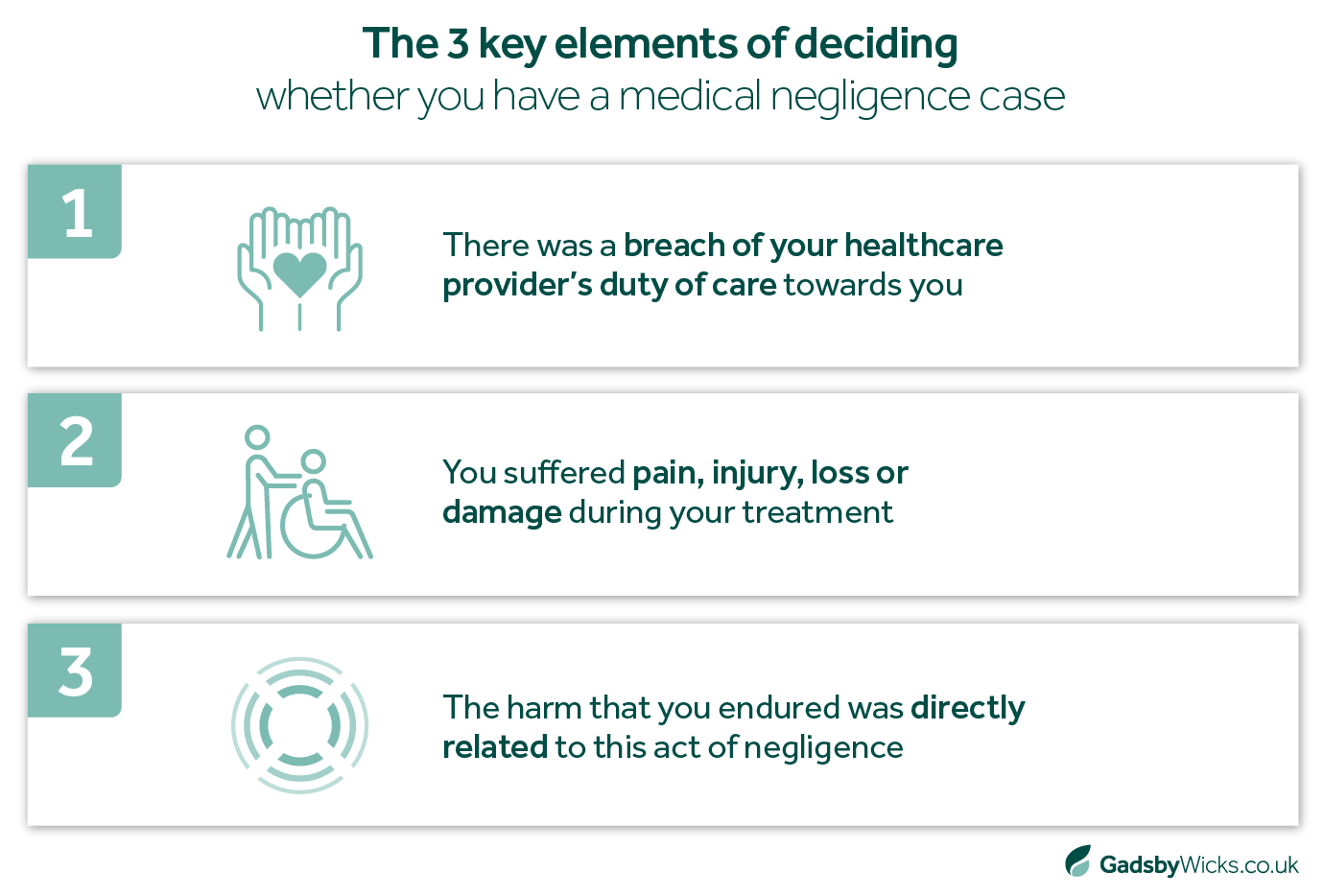Our medical negligence claims services


Your trusted medical negligence claims solicitors
If you were let down by a healthcare professional, you deserve compensation. You deserve answers. You deserve closure. At Gadsby Wicks, our medical negligence claims solicitors have helped people secure justice for over 30 years.
With thousands of claimants represented and millions won in compensation, we are the team you trust to achieve a successful outcome for you and your loved ones. We can’t undo the past, but we can secure your future – with no financial commitment from you at any stage.
Medical Negligence Claims Payouts & Compensation Guide
Compensation is the most tangible outcome of a medical negligence claim, and it’s natural to wonder how much your claim might be worth. But the value depends on numerous factors, from the nature of your injury or illness, to its long-term impact on your life.
With over 30 years of experience handling claims across Essex and East Anglia, we have secured settlements ranging from tens of thousands of pounds for minor surgical errors to multi-million-pound payouts for lifelong birth injuries. Our specialist expertise ensures we recover the financial support you need for your personal circumstances.
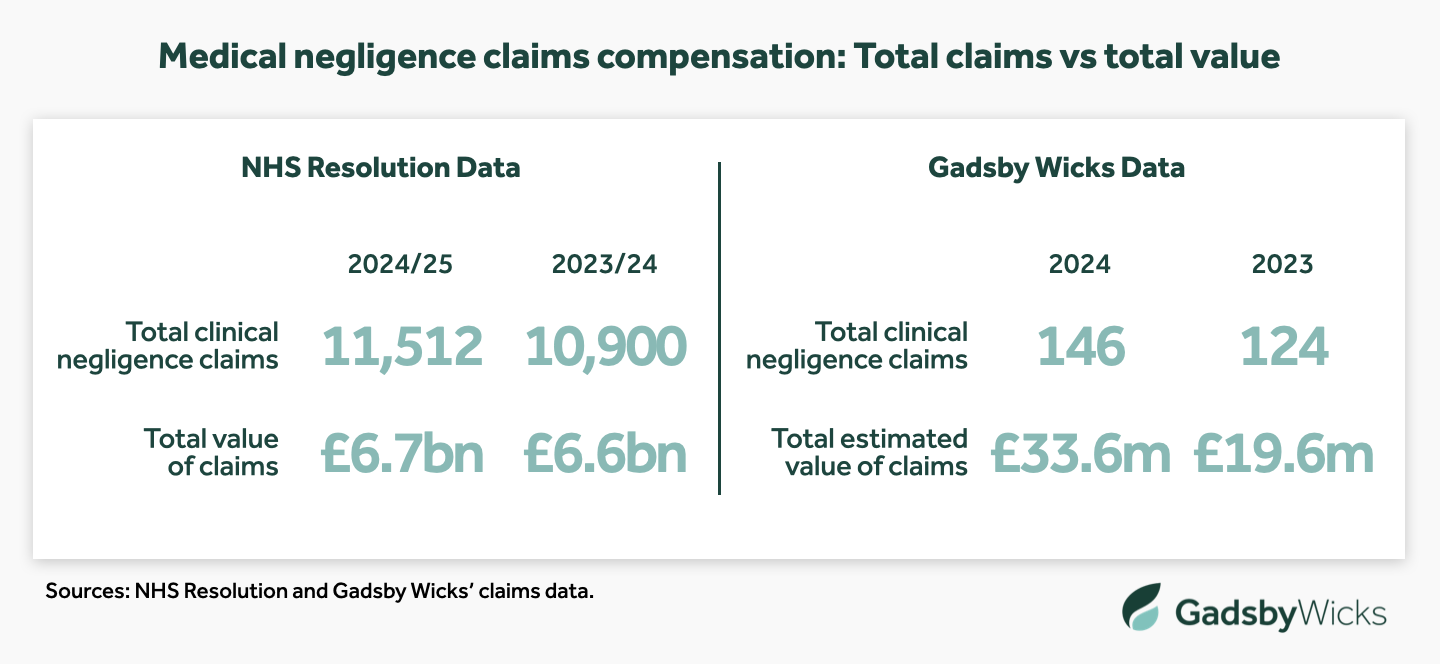
Understanding medical negligence compensation in the UK
According to the most recent Annual Report & Accounts from NHS Resolution, the total value of clinical negligence claims received in 2024/2025 was approximately £6.7 billion across 11,512 cases – a small 1.5% increase on the previous year’s data.
The claim type with the largest value was obstetrics (birth injuries) with 52.5% – significantly greater than emergency medicine in second place with 7.1%.
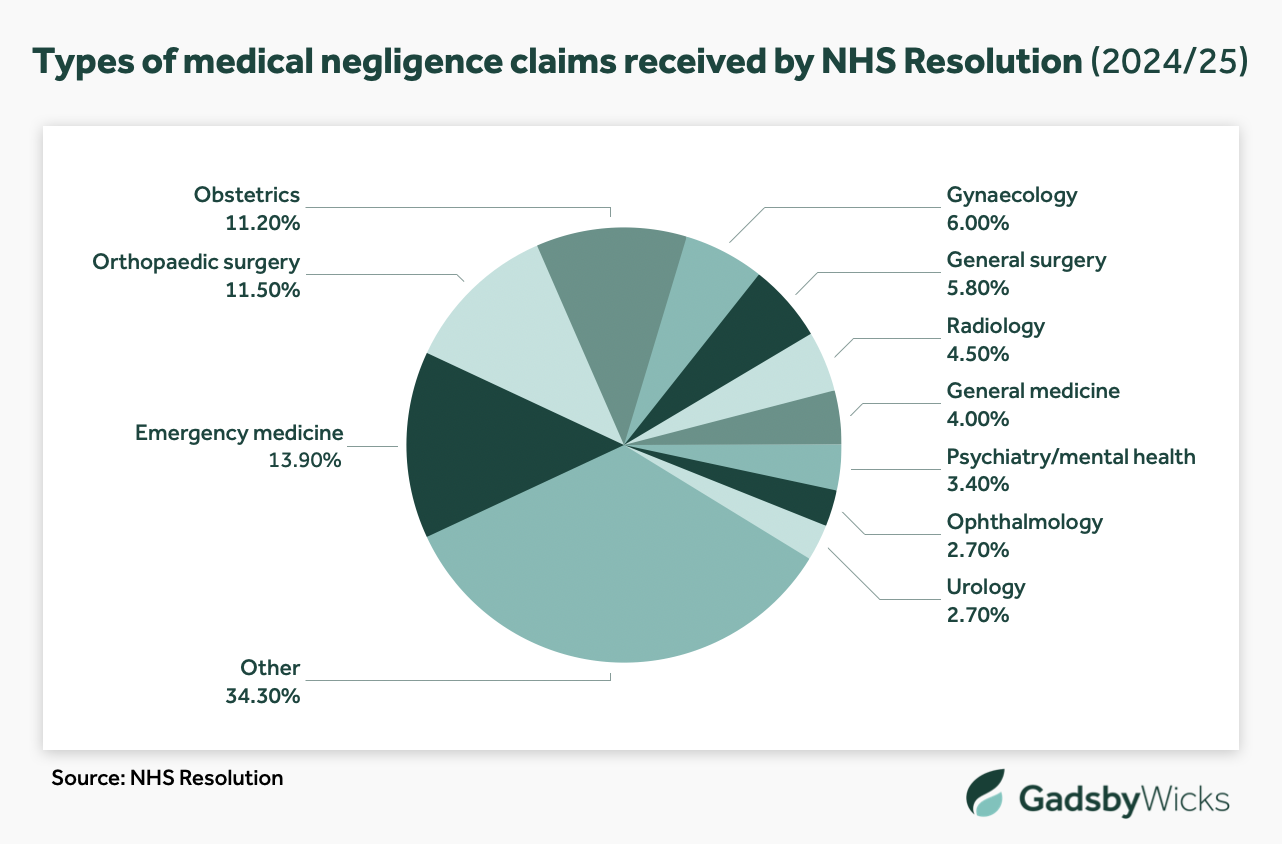
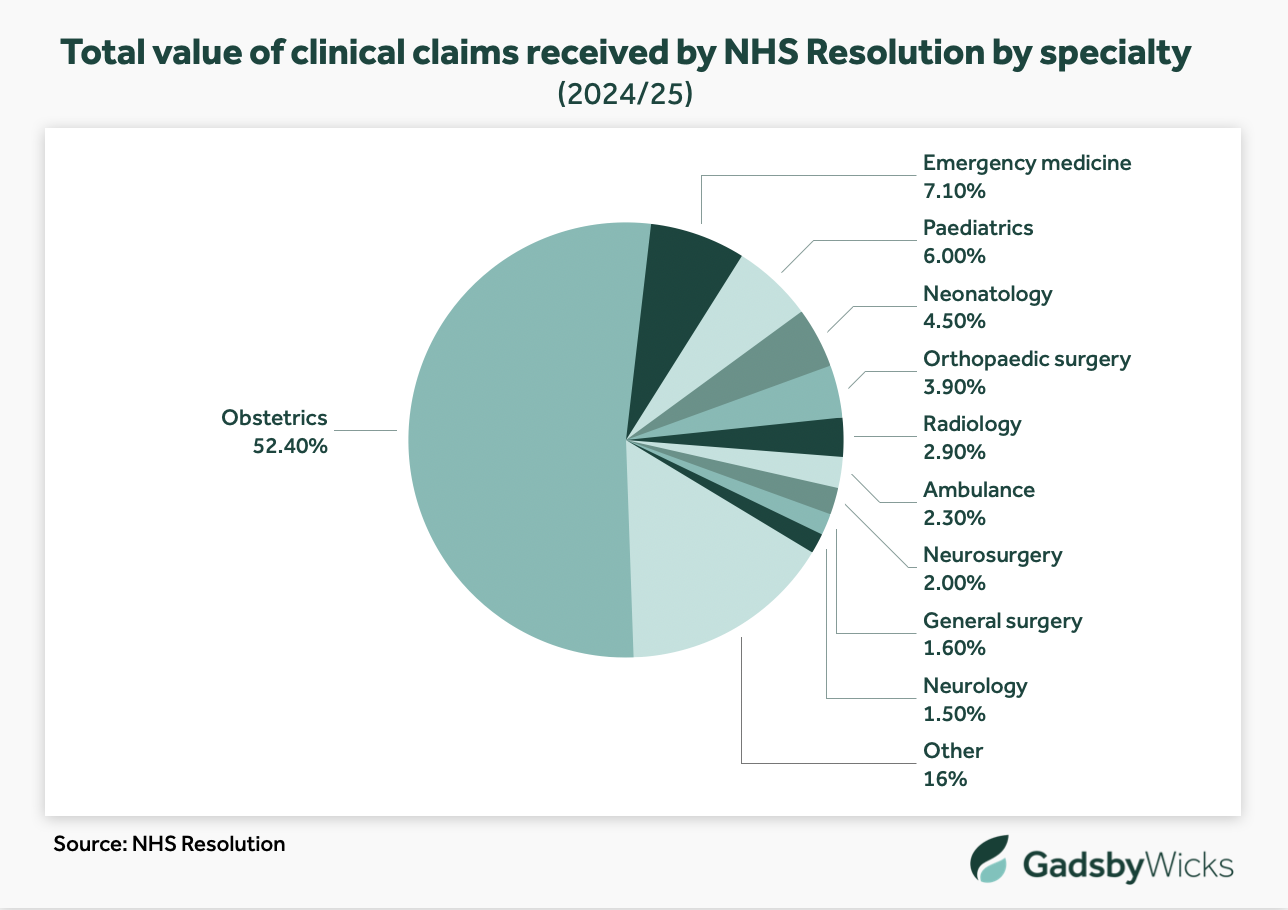
Compare this to our own data of medical negligence claims in Essex and East Anglia. Over the last five years (2021-2025), birth injury claims have represented 44.5% of the estimated value of our total number of claims, with delayed treatment/diagnosis at 27.2%.
This trend is primarily due to many birth injuries having life-changing implications for the children and families affected. Indeed, both our largest medical negligence payout (£26 million) and the largest NHS compensation award (£37 million) were birth injury claims.
We also witnessed a substantial 71.3% rise in the overall value of claims between 2023 and 2024. However, annual claims values can vary greatly in individual firms, so this should not be seen as the start of an ongoing trend.
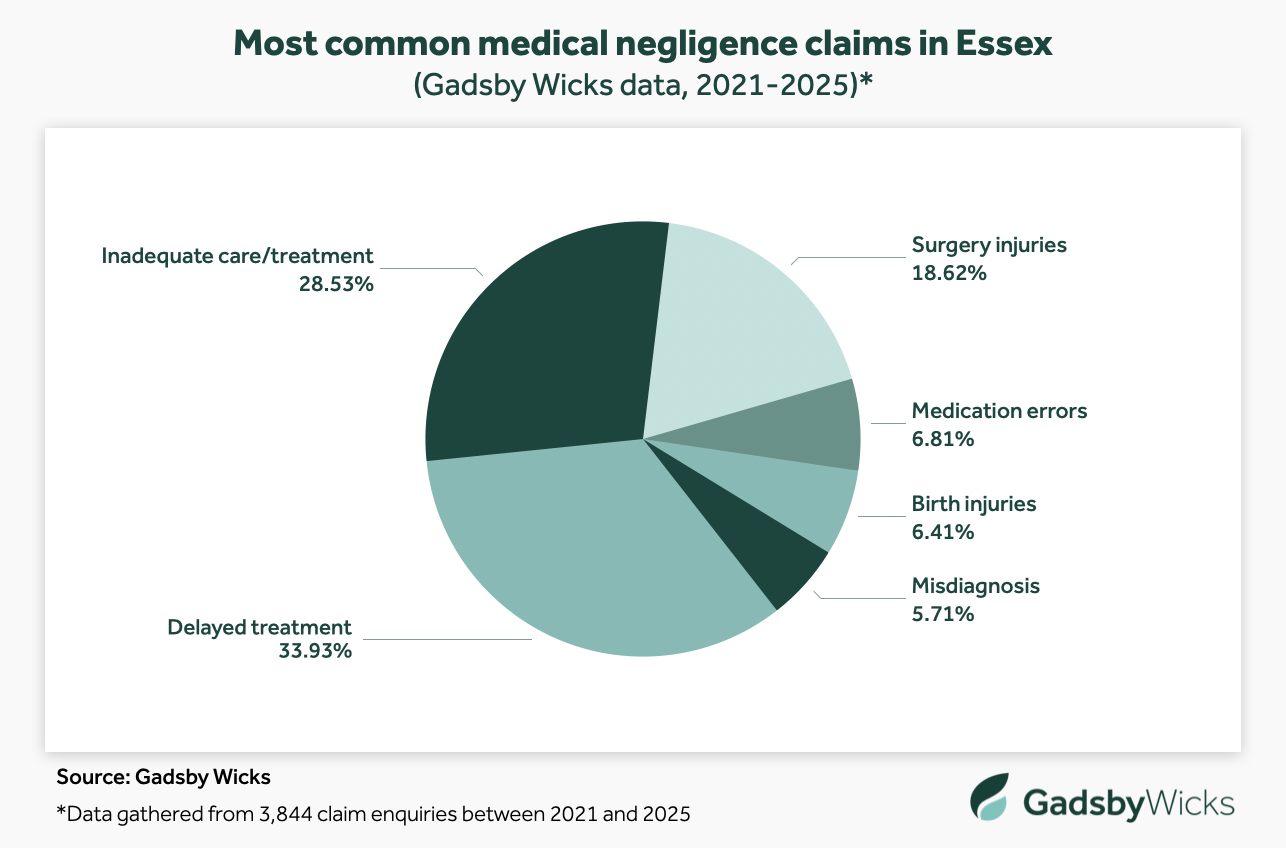
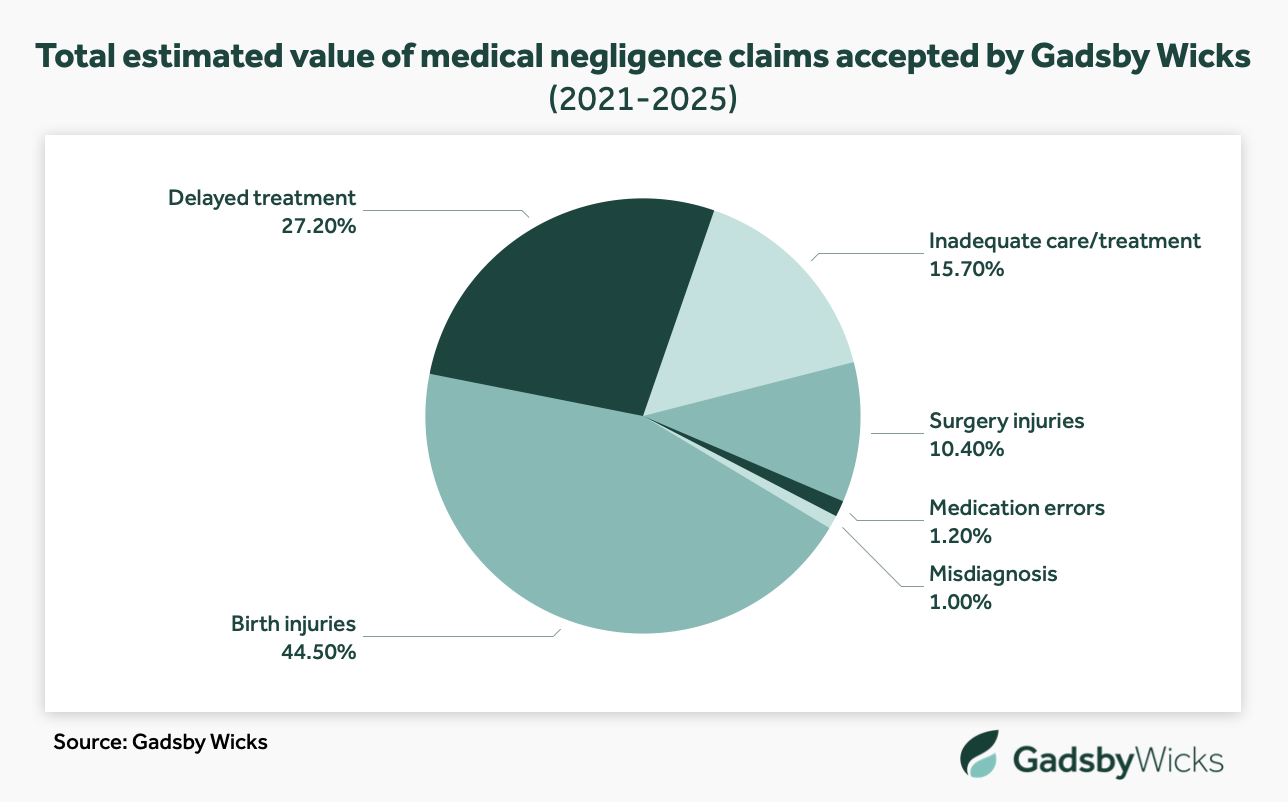
View our National and Essex Medical Negligence Statistics post for more information.
It is important to note that compensation is determined on a case-by-case basis. While both national and local data show us that birth injuries are typically the claims that attract the most compensation and misdiagnosis or medication errors the least, there is often a sizeable difference between the largest and smallest settlements in each type of claim.
Furthermore, compensation is not a lottery win or a windfall, even when millions are awarded. The settlement, no matter how big or small, is an accurate reflection of the pain, suffering and long-term impact that negligent treatment caused the claimant.
With over 30 years of exclusive experience in medical negligence, our solicitors have helped countless people whose lives were changed by substandard medical care. We understand how distressing it can be when your treatment goes wrong, and we are committed to securing the answers, justice and compensation you deserve.
How is medical negligence claim compensation calculated?
Compensation for medical negligence is split into two categories: general damages and special damages.
General damages for medical negligence claims
General damages refer to the compensation for a claimant’s pain, suffering, and loss of amenity (PSLA). This covers the physical and emotional harm caused by the negligent treatment, and any lasting impact on the claimant’s quality of life or ability to carry out everyday activities.
When assessing general damages, we may initially use the Judicial College Guidelines as a starting point. These offer guideline compensation values for personal injury claims across multiple different injuries, including (but not limited to):
- Brain and head injuries
- Injuries involving paralysis
- Injuries to internal organs
- Orthopaedic injuries
- Facial injuries and scarring
- Chronic pain
- Psychiatric and psychological damage
- Injuries resulting in death
You can view a sample of these in the table below – this is not a complete list due to the diverse range of injuries. Please keep in mind that JCG figures are only estimates – we always calculate general damages on a case-by-case basis.
We also only ever refer to JCG figures as a loose starting point. Unlike most personal injury claims, in the majority of medical negligence claims, the claimant was already unwell or injured before they received negligent treatment.
Therefore, we must first understand if our client was expected to return to their pre-injured state in any event. Then, we will judge the actual outcome against the expected outcome when calculating an appropriate amount of compensation for general damages.
For this reason, it’s essential to choose solicitors with specialist expertise in medical negligence. Our team takes a meticulous approach to every case, ensuring that your compensation fully reflects the physical and psychological impact on you and your life.
| Severity | Estimated Value Range | Notes |
|---|---|---|
| Brain injury | ||
| Very severe | £344,150 - £493,000 | Little meaningful response to environment, little language function, double incontinence and full-time nursing care. |
| Moderately severe | £267,340 - £344,150 | Seriously disability, with a substantial dependence on others and a need for constant professional care. |
| Moderate | £52,550 - £267,340 | Moderate to severe intellectual deficit and effects on sight, speech, senses, concentration and memory. |
| Less severe | £18,700 - £52,550 | Similar problems to moderate cases, but will have made a good recovery and will be able to take part in normal social life. |
| Injury involving paralysis | ||
| Tetraplegia / Quadriplegia | £396,140 - £493,000 | Full-body paralysis where the injured person is in no physical pain, but has full awareness of their disability. |
| Paraplegia | £267,340 - £346,890 | Lower-half paralysis, with damages dependent on the extent of pain, degree of independence, life expectancy and more. |
| Amputation of arms | ||
| Loss of both arms | £293,850 - £366,100 | Double-arm amputation that reduces a person with full awareness to a state of considerable helplessness. |
| Loss of one arm | £117,360 - £167,380 | Amputation of a single arm, with values depending on extent of amputation and if it's the person's dominant arm. |
| Bowel injury | ||
| Severe | Up to £224,790 | Cases involving double incontinence – total loss of bowel function and urinary function and control. |
| Moderately severe | Up to £183,190 | Total loss of natural function and dependence on colostomy (depending on age). |
| Moderate | In the region of £97,530 | Persistent faecal urgency and passive incontinence causing embarrassment or distress. |
| Less severe | £54,420 - £85,100 | Severe abdominal injury often necessitating temporary colostomy and/or restriction on diet and employment. |
| Bladder injury | ||
| Severe | Up to £224,790 | Cases involving double incontinence – total loss of bowel function and urinary function and control. |
| Moderately severe | Up to £171,680 | Complete loss of function and control. |
| Moderate | £78,080 - £97,540 | Serious impairment of control with some pain and incontinence. |
| Less severe | £28,570 - £38,210 | Where there has been almost a complete recovery but some fairly long-term interference with natural function. |
| Digestive system injury | ||
| Severe | £46,900 - £64,070 | Severe toxicosis causing serious acute pain, vomiting, diarrhoea and fever, requiring hospital admission. |
| Serious | £11,640 - £23,430 | Serious but short-lived food poisoning, diarrhoea and vomiting diminishing over two to four weeks. |
| Moderate | £4,820 - £11,640 | Food poisoning or allergic reaction causing discomfort, stomach cramps, alteration of bowel function and fatigue. |
| Female reproductive system injury | ||
| Very severe | £140,210 - £207,260 | Infertility with sexual dysfunction, severe depression and anxiety, pain and scarring. |
| Severe | £52,490 - £124,620 | Likely permanent sexual dysfunction in the case of a person with children or who is unable to have children. |
| Moderately severe | £68,440 - £87,070 | Infertility with no aggravating features and no sexual dysfunction in a young person without children. |
| Moderate | £21,920 - £44,840 | Infertility without medical complications and no sexual dysfunction where the injured person already has children. |
| Kidney injury | ||
| Severe | £206,730 - £256,780 | Serious and permanent damage to or loss of both kidneys. |
| Serious | Up to £78,080 | Where there is significant risk of future urinary tract infection or other total loss of natural kidney function. |
| Moderate | £37,550 - £54,760 | Loss of one kidney with no damage to the other |
| Injuries affecting sight | ||
| Most severe | In the region of £493,000 | Total blindness and deafness. |
| Very severe | In the region of £327,940 | Total blindness. |
| Severe | £78,040 - £219,400 | Loss of sight in one eye with reduced vision in the remaining eye, depending on extent of vision loss. |
| Moderately severe | £66,920 - £80,210 | Total loss of one eye, depending on age, psychiatric consequences and cosmetic effect. |
| Moderate | £60,130 - £66,920 | Complete loss of sight in one eye, taking account of some risk of sympathetic ophthalmia. |
| Deafness or tinnitus | ||
| Very severe | £133,810 - £171,680 | Total deafness and loss of speech, often due to deafness occurring at an early age. |
| Severe | £110,750 - £133,810 | Total deafness, with award depending on occurrence of speech deficit or tinnitus. |
| Moderately severe | £38,210 - £55,570 | Total loss of hearing in one ear, with award depending on level of tinnitus, dizziness or headaches. |
| Moderate | £8,560 - £55,570 | Partial hearing loss and/or tinnitus. |
| Impairment of taste/smell | ||
| Severe | In the region of £47,810 | Total loss of taste and smell. |
| Moderately severe | £40,150 - £47,810 | Total loss of smell and significant loss of taste. |
| Moderate | £30,500 - £40,150 | Loss of smell only. |
| Serious | £23, 430 - £30,500 | Loss of taste only. |
| Chronic pain disorders | ||
| Severe | £51,410 - £76,870 | Significant, ongoing symptoms despite treatment, adversely impacting ability to work and requiring care/assistance. |
| Moderate | £25,710 - £46,970 | Symptoms are ongoing, albeit to a lesser degree than the above and a less marked difference on daily life. |
| Psychiatric injury | ||
| Severe | £66,920 - £141,240 | Problems affecting life, education and work, negative impact on relationships, high vulnerability and poor prognosis. |
| Moderately severe | £23,270 - £66,920 | Similar problems with a more optimistic prognosis, such as psychiatric injury following a negligent stillbirth or traumatic birth. |
| Moderate | £7,150 - £23,270 | Similar problems to the above but there will have been marked improvement by trial and a good prognosis. |
Special damages for medical negligence claims
Special damages account for the specific financial losses you have incurred as a result of negligent treatment. This can include a range of factors unique to your situation, such as lost earnings, treatment costs, and expenses related to ongoing care or support.
Examples of special damages for medical negligence can include:
- Medical and rehabilitation expenses, such as corrective procedures, consultations, private treatment, physiotherapy, counselling, or long-term medication required to manage ongoing symptoms.
- Equipment, accommodation and transport, including mobility aids, specialist beds, home adaptations, or vehicle modifications needed to support your independence and daily comfort.
- Care and support costs, covering professional carers, nursing assistance, or the financial value of care provided by family members and friends.
- Loss of earnings and future income, compensating for time taken off work during recovery and the long-term impact on your ability to work or progress in your career.
- Travel expenses, including journeys to and from hospitals, clinics or rehabilitation appointments.
- Other out-of-pocket expenses, such as specialist dietary needs, childcare costs during treatment, or the replacement of damaged clothing or personal items.
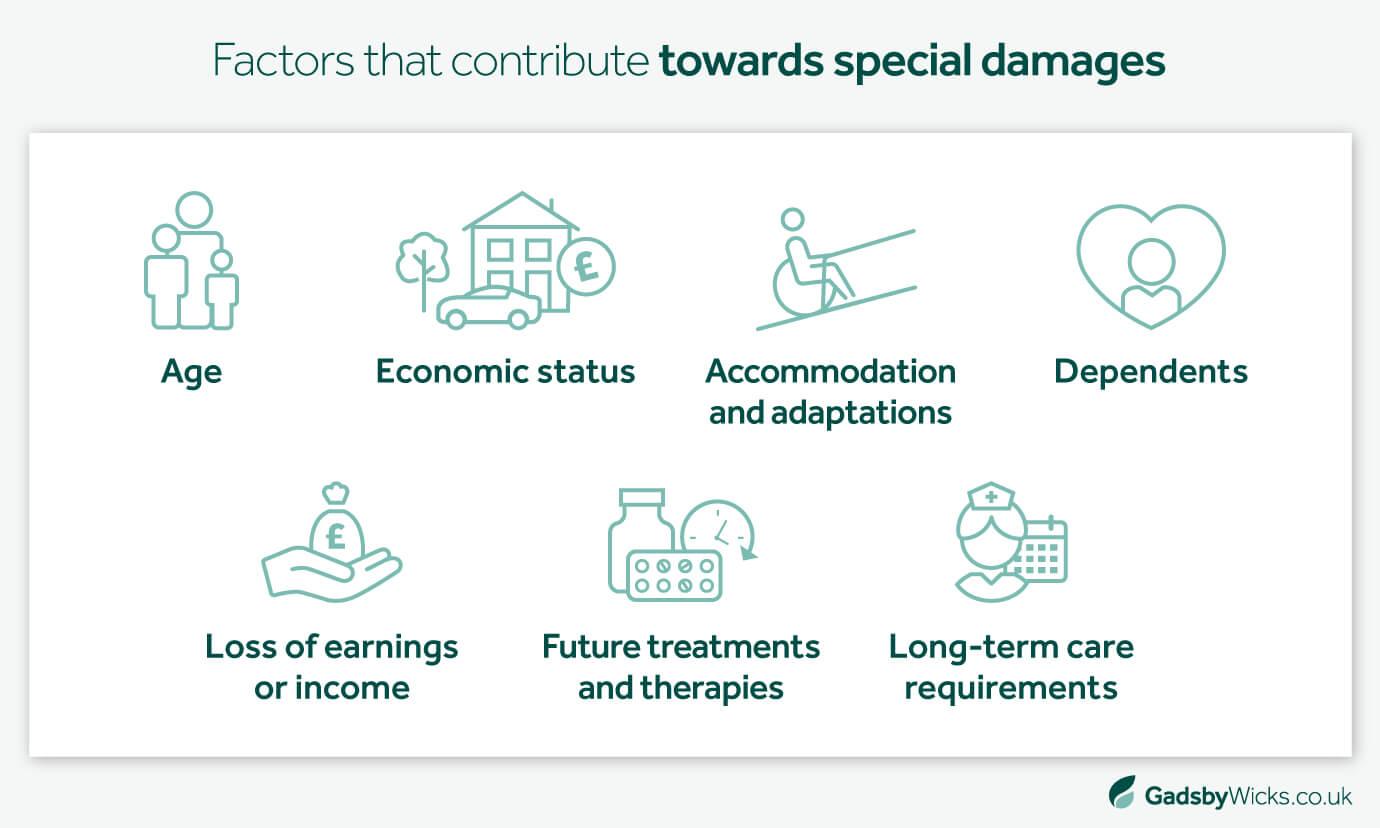
Special damages are assessed with each individual’s unique circumstances and ongoing care requirements – meaning the amount of compensation can vary widely.
For example, consider two patients who suffer the same nerve injury to their hand due to an error during wrist surgery:
- Claimant A is a self-employed hairdresser who heavily relies on manual dexterity
- Claimant B is retired
In this instance, Claimant A will likely recover more special damages due to the impact on their ability to earn and career progression.
Alternatively, two patients suffer permanent mobility issues due to a delay in diagnosing their hip fractures.
- Claimant C is a young professional in a city flat with lift access
- Claimant D is an older person living in a rural house with stairs
Here, Claimant D will likely receive more special damages due to their age, home environment and support needs.
Working alongside medical experts, care professionals, and forensic accountants, our solicitors take a detailed, evidence-based approach to valuing your claim. We assess the full financial impact to ensure your special damages accurately support your recovery, independence and long-term wellbeing.
What is the average medical negligence claim settlement in Essex?
We are often asked what the average medical negligence claim is worth. However, an "average" payout is not a reliable indicator because of the wide variation in types of claims.
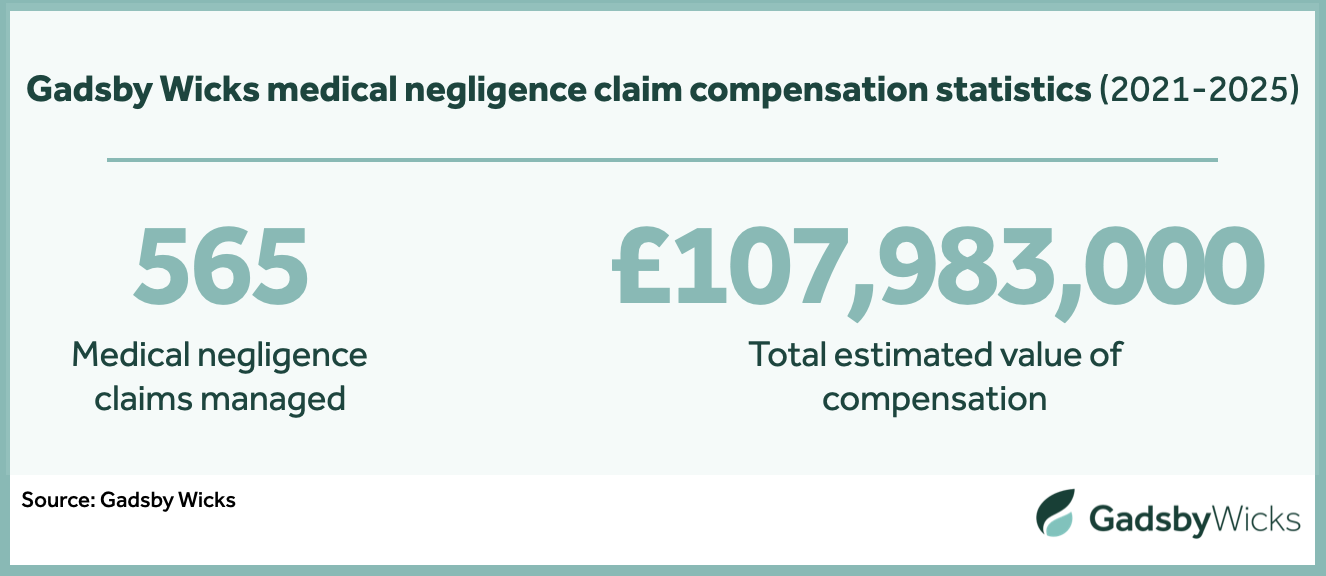
Every medical negligence case is unique, shaped by the nature of the treatment, the severity of the harm, the long-term impact and more. Even cases that seem alike on the surface can have very different settlements.
At Gadsby Wicks, we take the time to understand your experience, how the negligence affected your health and wellbeing, and what you need to rebuild your future. With decades of dedicated expertise in medical negligence, we work tirelessly to secure a settlement that provides lasting support and peace of mind.
Should I use a medical negligence compensation calculator?
You may have found online tools designed to estimate the value of your medical negligence claim – but these are often misleading.
Compensation calculators are more tools to generate enquiries than to provide useful information. With decades of experience handling cases across Essex and East Anglia, we know that no claim can be accurately assessed without a full understanding of your circumstances and the supporting medical evidence.
At Gadsby Wicks, we value honesty and transparency above everything. Every client’s experience is unique, so we take the time to understand how negligence treatment has affected your life before giving clear, realistic advice about the compensation you are entitled to.
Examples of medical negligence claim compensation amounts
Here are a few examples of medical negligence settlements we’ve secured for clients across Essex and East Anglia:
- £26 million for a birth injury claim where our client was born with severe Cerebral Palsy due to preventable oxygen starvation
- £400,000 after a woman tragically lost her life after multiple misdiagnoses of her breast cancer allowed it to become terminal
- £180,000 for mistakenly severing our client’s bile duct during gallbladder removal, requiring additional surgery and a prolonged recovery
- £150,000 for the delayed treatment of an aortic aneurysm, which caused the patient to suffer renal and cardiac failure
- £95,000 after our client lost all vision in her left eye when her GP failed to diagnose giant cell arteritis and polymyalgia rheumatica
- £80,000 after a mistake during our client’s hysterectomy caused lasting kidney damage
- £42,500 for the delayed diagnosis and treatment of our patient’s eroded gastric band, causing digestive and dental issues
Case studies for some of our medical negligence claims

The true specialists in medical negligence claims since 1993
We only specialise in medical negligence claims – and have done since 1993. We believe it is the only way to give your case the attention and expertise it demands. You’ll never find us working in other areas of the law, so you get expert advice at every step.
We are the only dedicated medical negligence firm in Essex and East Anglia, and one of the most reputable firms in the UK. No matter the complexity of your claim, we work with compassion, integrity and professionalism to secure the right settlement for your needs.
What does our medical negligence claims legal process look like?

A free initial consultation
Call us, request a callback or complete our online form and we’ll assess if you have a valid medical negligence claim.

Funding your claim
Discover the ways we can fund your claim without you paying a penny at any stage of the process.

Investigating evidence
We gather medical records, witness statements and more to learn what happened to you and prove your claim.

Instructing independent medical experts
We work with impartial, experienced medical experts to establish whether your injuries were due to substandard medical care.

Valuing your claim
We assess your health and financial losses to accurately estimate how much compensation your claim is worth.

Presenting your case
We contact the Defendants and the Courts on your behalf to set out your allegations and receive a response.

Negotiating a settlement
We work to achieve a fair settlement for you outside the courtroom – this is how 96% of our cases end.

Preparing for Trial
If we must proceed to Trial, we fully prepare you for what to expect so you receive the right result in court.
What you need to know about medical negligence compensation claims
What is medical negligence?
Medical negligence, also known as clinical negligence, is harm or injury caused by substandard medical treatment.
Examples of medical negligence include:
- Birth injuries affecting the baby, mother or both
- Mistakes during surgery and other procedures
- Misdiagnosis of a condition
- Delayed treatment of an injury or illness
- Incorrect prescription or usage of medication
A medical negligence or hospital negligence claim does not necessarily need to apply to the negligence of a GP or doctor. It covers negligence by any healthcare professional, including:
- Opticians
- Dentists
- Cosmetic surgeons
- Mental health professionals
- Physiotherapists
- Midwives
Who can make a medical negligence claim?
If a hospital, doctor, nurse or surgeon has given you inadequate care that resulted in distress, injury or life-changing circumstances, by law you can make a medical negligence claim.
Compensation can provide financial support when a medical mistake impacts how you live your life, helping you to pay for ongoing care, cover loss of earnings and purchase specialist equipment.
We are specialist medical negligence claims solicitors who have only worked on medical negligence claims since we were founded in 1993.
Who can I make a medical negligence claim against?
A medical negligence claim can be made against an NHS hospital, private hospital or individual medical professional. This includes:
- GPs
- Hospital doctors
- Nurses
- Midwives
- Dentists
- Physiotherapists
- Psychologists
- Psychiatrists
- Osteopaths
- Opticians
If the alleged negligence was by someone working in an NHS hospital, the claim is made against the relevant NHS Hospital Trust.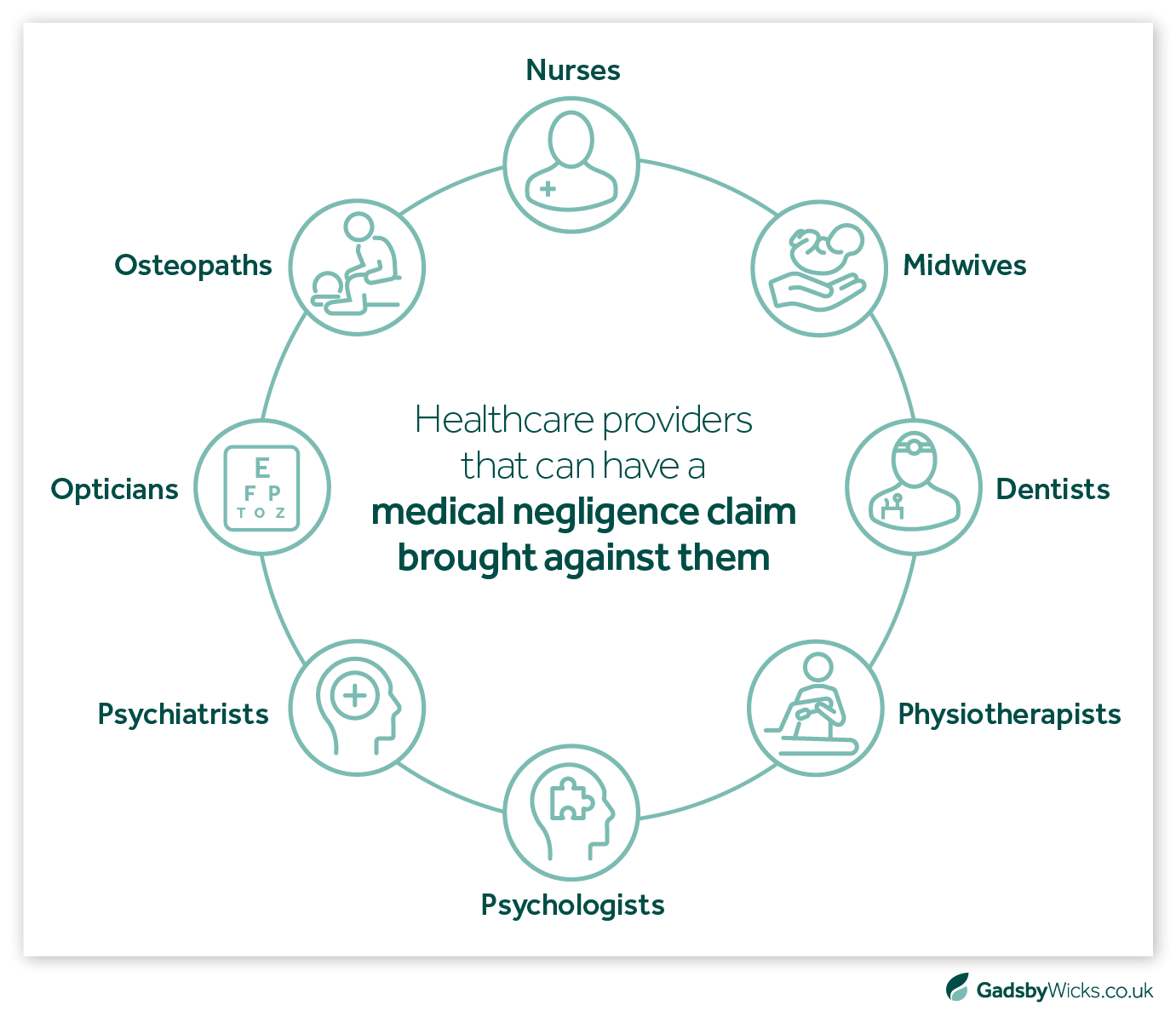
What is the difference between medical negligence and clinical negligence?
In a practical sense, there is no meaningful difference between medical negligence and clinical negligence claims. Both are used interchangeably when discussing negligent acts, malpractice or mistakes that breach the duty of care healthcare professionals have to their patients.
However, the difference lies in the origins of clinical negligence in the legal world. It was asserted that the term “medical negligence” gave the impression that someone could only claim a doctor or a similar professional, or that the incident must take place in a hospital.
The term “clinical negligence” was employed to emphasise that someone can present a case against any healthcare professional. However, today it is considered to have the same meaning as medical negligence.
What types of medical negligence claims do you cover?
As expert medical and clinical negligence solicitors, our teams of lawyers and industry specialists are able to cover all types of claim compensation case.
Some of our specialist areas of expertise include compensation for birth injuries such as Cerebral Palsy claims, neonatal deaths and injuries to mothers that include claiming for perineal tears.
We also have a vast amount of experience at handling sensitive cases for brain injury claims, spinal injury and paralysis claims, and heart negligence claims, as well as orthopaedic surgery claims.
View the services listed in our menu but please also understand that each case is unique, and there are hundreds of potential conditions or incidents that can occur through negligence. Find out if you have a valid claim today.
What can a medical negligence claim achieve?
Litigation can be expensive, stressful and time-consuming, so it is important to know what a medical negligence claim can and cannot achieve.
What a claim can achieve:
The primary goal of a medical negligence claim is to recover financial compensation that returns you to the position you would have been had negligence not occurred (as far as money can). As your lawyers, this is our core objective when pursuing your case.
A medical negligence claim can also:
- Secure access to the best possible medical treatment, therapy, and rehabilitation
- Obtain answers for what happened to you for a better peace of mind
- Encourage systematic improvements in hospital procedures, helping to prevent similar errors in the future
What a claim cannot achieve:
However, whilst we try to obtain an apology, this is not always possible, even if blame is admitted and the Defendants agree to pay you compensation.
Furthermore, a successful claim for medical negligence will not directly affect the ability of any doctor or nurse to continue to practise medicine.
Meet our medical negligence claims solicitors
Why choose Gadsby Wicks medical negligence solicitors?

Lexcel accredited medical negligence claims solicitors
We are proud to be a Lexcel-accredited practice. The accreditation is a mark of quality and comes directly from the Law Society.
A recent assessment described us as a “Centre of Excellence” and we continue to operate to the highest standards across all main areas of our field. These include client care, case management, financial management, structure and strategy, people management, risk management, information management and file management.

